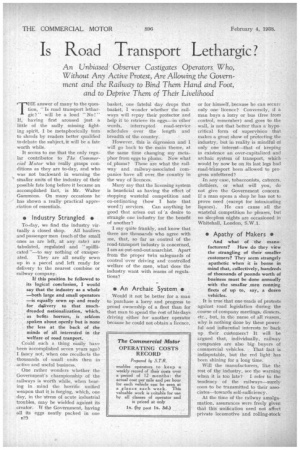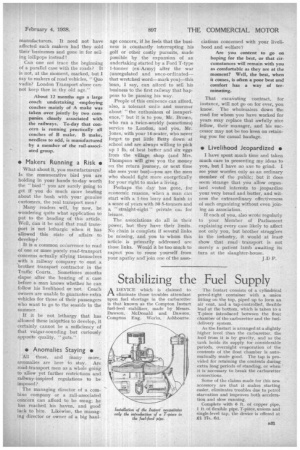Is Road Transport Lethargic?
Page 18

Page 19

If you've noticed an error in this article please click here to report it so we can fix it.
An Unbiased' Observer Castigates Operators Who, Without Any Active Protest, Are Allowing the Government and the Railway to Bind Them Hand and Foot, and to Deprive Them of Their Livelihood
THE answer of many to the question, "Is road transport lethargic?" will be a loud " No 1 " If, having first aroused just a little of the sadly, missing fighting spirit, I be metaphorically torn to shreds by readers better qualified to debate the subject, it will be a fate worth while.
It seems to me that the only regular contributor to The Commercial Motor who really grasps conditions as they are to-day, and who was not backward in warning the sinaller units of the industry of their possible fate long before it became an accomplished fact, is Mr. Walter Gammons. On many occasions he has shown a really practical appreciation of essentials.
• Industry Strangled •
To-day, we find the industry vir tually a closed shop. All hauliers and passenger men (such of the small ones as are left, at any rate) are • tabulated, regulated and " spiffii • cated "—to say nothing of exasper ated. They are all neatly sewn up in a parcel and left ready for delivery to the nearest combine or railway company.
If this position be followed to its logical conclusion, I would say that the industry as a whole —both large and small operators —is equally sewn up and ready for &slivery to that muchdreaded nationalization, which, as befits horrors, is seldom spoken about openly but is none the less at the back of the minds of all interested in the welfare of road tranport. .
Could such a thing easily have been accomplished seven years ago?. I fancy not, when one recollects the thousands of small units then •in . active and useful business.
One rather wonders whether the Government's championship of the railways is worth while, when bearing in mind the horrific unified weapon that it is forging, which, one day, in the stress of acute industrial troubles, may be wielded against its creator. if the Government, having all its eggs neatly packed in one basket, one fateful day drops that basket, I wonder whether the railways will repay their protector and help it to retrieve its eggs—in other words, interrupted road-service schedules over the length and breadth of the country.
However, this is digression and I will go back to the main theme, at the same time changing my metaphor from eggs to plums. Now what of plums? These are what the railway and railway-associated companies have all over the country in the way of licences.
Many say that the licensing system is beneficial as having the effect of stopping wasteful competition and co-ordinating (how I hate that word !) services. Can anything be good that arises out of 'a desire to strangle one industry for the benefit of another?
I say quite frankly, and know that there are thousands who agree with me, that, so far as control of the road-transport industry is concerned, I am an put-and-out anarchist. Apart from the proper twin safeguards of control over driving and controlled welfare of the men, what does the industry want with reams of regulations?
e An Archaic System o
' Would it not be better for a man to purchase a lorry and progress to proud ownership of a fleet than for that man to spend the test of his days driving either for another operator because he could not obtain a licence, or for himself, because he can secure only one licence? Conversely, if a man buys a lorry or bus (free from control, remember) and goes to the wall, is not that better than a hypocritical form of supervision that makes a great show of protecting the industry, but in reality is mindful of only one interest—that of keeping in existence an over-capitalized and archaic system of transport, which would by now be on its last legs had road-transport been allowed to progress unfettered?
In any case, tobacconists, caterers, clothiers, or what will you, do not give the Government concern If a man opens a shop he has not to prove need (except for intoxicating liquors). He can cause all the wasteful competition he pleases, but no sleepless nights are occasioned in Whitehall, London, &W.1.
• Apathy of Makers •
And what of the manufacturers? How do they view the strangling of their smaller customers? They seem strangely apathetic when it is borne in mind that, collectively, hundreds of thousands of pounds worth of business must be done annually with the smaller ,men running fleets of up to, say, a dozen vehicles.
It is true that one -reads of protests against road legislation during., the course of company meetings, dinners, etc., but, in the name of all reason, why is nothing done by these powerful and influential interests to back up their customers? It will be argued that, individually, railway companies are also big buyers of commercial vehicles. That fact is indisputable, but the red light has been shining for a long time.
Will the manufacturers, like the rest of the industry, see the warning when it is too late? I refer to the tendency of the railways—surely soon to be transmitted to their associates—towards self-sufficiency.
At the time of the railway amalgamation, assurances were freely given that this unification need not affect private locomotive and rolling-stock manufacturers. It need not have affected such makers had they sold their businesses and gone in for selling lollipops instead !
Can one not trace the beginning of a parallel case with the roads? It is not, at the moment, marked, but I say to makers of road vehicles, " Quo vadis? London Transport alone cannot keep thee in thy old age."
About 12 months ago a large coach undertaking • employing coaches mainly of A make was taken over jointly by two companies closely associated with the railways. To-day that concern is running practically all coaches of B make. B make, needless to add, is manufactured by a member of the rail-associated group.
• Makers Running a Risk e
What about it, you manufacturers? Is the remunerative bird you are holding in your hands to-day worth the " bird " you are surely going to get if you do much more beating about the bush with your genuine customers, the real transport men?
Many readers will, by now, be wondering quite what application to put to the heading of this article. Well, can it he said that road transport is not lethargic when it has allowed this state of affairs to • develop?
It is a common ocCurrence to read of one or more purely road-transport concerns. actually allying themselves with a railway company to oust a -brother transport contractor in the Traffic Courts. Sometimes months elapse after the hearing of a case before a man knows whether he can follow his livelihood or not. Coach owners are unable to guarantee extra vehicles for those of their passengers who want to go to the seaside in the summer.
If it be not lethargy that has allowed these iniquities to develop, it certainly cannot be a sufficiency of that vulgar-sounding but curiously apposite quality, "guts."
• Anomalies Staying •
All these, and many more, anomalies are here to stay. Are road-transport men as a whole going to allow yet further restrictions and railway-inspired regulations to be imposed?
The managing director of a combine company or a rail-associated conCern can afford to be smug; he has reached his haven, and good luck to him. Likewise, the managing director or owner of a big haul
age concern, if he feels that the business is constantly interrupting his golf or other costly pursuits, made possible by the expansion of an undertaking started by a Ford T-type 1-tonner (ex-Army) after the war (unregulated and unco-ordinated'-.that wretched word—mark you)—this 'inan, I say, can afford to sell his business to the first railway that happens to be passing his way.
People of this eminence can afford, also, a tolerant smile and murmur about "the enthusiasm of inexperience," but it is to you. Mr. Brown, who run a twice-weekly (sometimes) service to London, and you, Mr. Jones, with your 14-seater, who never fotget to put little Betty down at school and are always willing to pick up 1 lb. of best butter and six eggs from the village shop (and Mrs. Thompson will give you the money on the return journey, or next time she sees your bus)—you are the men who should fight more energetically for your right to make a living.
Perhaps the day has, gone, for economic reasons, when a man can start with a 1-ton lorry and finish in a score of years with 30 5-tonners and a, " straight-eight " private cm. for leisure.
The associations do all in their power, but they have their limits. No chain is complete if several links be missing, and you to whom this article is primarily addressed are those links. Would it be too much to expect you to rouse yourself from your apathy and-join one of the asso
ciations concerned with your livelihood and welfare?
Are you content to go on hoping for the best, or that circumstances will remain with you as comfortable as they are at the moment? Well, the best, when it comes, is often a poor best and comfort has a way of terminating.
That excoriating contract, for instance, will not go on for ever, you know. The wholesalers down the road for whom you have worked for years may replace that awfully nice fellow, their manager, and his successor may not be too keen on retaining you for casual haulage.
• Livelihood Jeopardized •
I have spent much fine and taken much care in presenting my ideas to you, but I have no axe to grind. I see your worries only as an ordinary member of the public; but it does seem Strange that you allow organized vested interests to jeopardize your very bread and butter, and witness the extraordinary effectiveness of such organizing without even joining an association.
If each of you, also wrote regularly to your Member of Parliament explaining every case likely to affect not only you, but brother strugglers in the industry, it would at least show that road transport is not merely a patient lamb awaiting its turn at the slaughter-house.


































